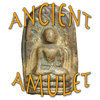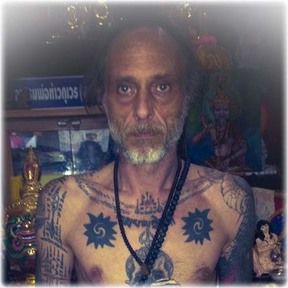Online Only 24/7/365 Based in Krabi Thailand.
Krabi
24/7
Monday-Sunday
12:00 am - 12:am

Pra Gesar Kroo Ba Srivichai Pim Pra Rod Sacred Amulet in Nuea Pong Kluk Rak Pasom Gesa, Sacred Powders with hairs of the great Lanna Guru Monk, Kroo Ba Srivichai.
Considered a very sacred Amulet of the Devotee of Luang Por Kroo Ba Srivichai who lived from 2421 to 2481 BE, and was one of the Great Lanna Masters of Olden Days. Kroo Ba Srivichai endured and passed some of the greatest tests of endurance a practitioner could have, and whose merits have reached far and wide around the world, to his many devotees. He is the greatest source of spiritual inspiration and comfort for the Thai Lanna Folk of the Northern region, and considered an Arahant by most Thai Buddhists.
It is said that the Pra Pong Gesa Kroo Ba Srivichai was not made by Kroo Ba Srivichai, rather, that it was made posthumously. It contains his hairs, and was made by devotee monks and Laymasters of his lineage, after Kroo Ba Apichai his direct apprentice collected a large quantity of Kroo ba Srivichai's hair throughout his lifetime.
Kroo Ba Apichai was with Kroo Ba Srivichai along with 500 Karen Hilltribe People who were helping Kroo Ba Srivichai to build the road to Wat Doi Sutep in Chiang Mai, and asked Kroo Ba Srivichai to Ordain him, which he did, and Kroo Ba Apichai went to stay and practice with him at Wat pra Singh. But this was one of the causes of Kroo Ba Srivichai being punished and imprisoned within the temple later for performing ordination without proper status of Upachaya. This caused Kroo Ba Apichai's ordination to be nullified, and Kroo Ba Apichai then spent the rest of his life in white robes, but otherwise kept the same rules and precepts as any fully ordained monk.
Years later in 2540 BE, Ajarn Padung Puttasaro of Wat Lan Dtong Sangampaeng who was seeking to make amulets, encountered a Pha Khaw Duang Dta (white robed practitioner of the Kroo Ba Srivichai Lineage - assumed to be Kroo Ba Apichai), and was revealed to have various bamboo tubes with cloths inside full of the hairs of Kroo Ba Srivichai, which he had kept as Muan Sarn for amulets, throughout the life of Kroo Ba Srivichai as he would shave his head.
Ajarn Padung was able to use some for his 2540 series of amulets. It is said that the Pra Gesa Kroo Ba Srivichai amulet has been made by various white robed Masters of various Samnak Badibat of Kroo Ba Srivichai Lineage, all of them using the hairs of Kroo Ba Srivichai.
All of the models of Pra Gesa Kroo Ba Srivichai amulets are usually in style of the Ancient Pra Kru Amulets of Lampun Province, such as the Pra Rod, Pra and Kong. Other Muan Sarn used in their making is known to include; Flowers and Pollens from the Uposatha Shrineroom, Bai Sri, and Bai Po Bodhi leaves, which were chopped into pieces and dried in the sun, and and ground into powders whilst roasting in a dry cauldron until they blackened.
Below; Kroo Ba Apichai, the 'white robed monk', who gathered and collected the hairs of Kroo Ba Srivichai
These powders were mixed with Kroo Ba Srivichai's hairs and a black herbal resinous substance was used to mix the powders and hairs (Gesa) into a blackish sacred clay, and molded into the shape of Buddha Amulets. The amulets were always blessed with the same Lanna Lineage Master Wai Kroo Ceremony to Kroo Ba Srivichai. The Pra Gesa Kroo Ba Srivichai has the appearance hence of a sticky resinous paste that has dried with ageing, which is known as 'Nuea Pong Pasom Gesa Kluk Rak'.
The amulets were made around the same time as the Rian Run Raek first edition Kroo Ba Srivichai Monk Coin, which was also made and blessed posthumously by the Samnak of Kroo Ba Srivichai's Looksit (Devotees), and which also enjoy immense popularity with devotees, as well as within the amulet appreciation society scene. Considered a very Sacred Amulet with the hairs of one of the Thai Lanna tradition's greatest monks of all time.
This amulet is filed in the official documentation catalog of preferred Pra Niyom amulets of the Kroo Ba Srivichai and the Lanna Masters categories, as a classic and highly regarded and sacred amulet. An excellent Buddhanussati amulet for practitioners of the Buddhist path, meditation, and devotees of the Great Monk Kroo Ba Srivichai.
Kroo Ba Srivichai was known as the 'Engineer Monk'. The architectural skill involved in creating the centuries-old chedis and temples that abound in Northern Thailand are a source of wonder in themself. Much of this beauty, however, would have been lost to future generations, but for the dedication and guidance of a man revered by many as the Buddhist saint of northern Thailand, Kroo Ba Sri Vichai.
It was in the midst of a violent thunderstorm, that a farmer's wife in a poverty-stricken village in District of Lee, Lamphun Province (pronounced Lumpoon)gave birth to a son. The year was 1878, and moments after his coming into the world, the skies cleared. The wind gave way to a gentle breeze, and the torrential rain ceased.
The baby was named Inta Fern, (good sign, or omen) or Fah Rohng (violent thunderstorm). As he grew up, his father gave Fern responsibility for the care of the family's livestock. While still but a child, he would take the buffaloes out to pasture while his parents toiled in the rice paddies.
Fuen tended to the beasts' every need from dawn until dusk each day; showing them kindness and understanding. Shortly after his tenth birthday, he and his animals were caught up in a thunderstorm, and Fern took shelter beneath a nearby palm tree. As the rain eased off, and the storm moved away, the boy saw a monk approaching. Running to greet the pilgrim with a most respectful Wai, Fuen declared that one day he too would join the priesthood.
Above; Code stamp "U" is embossed onto the base of the statuette
The monk, sensing that there was something special about this boy, approached Fern's parents, and asked them to allow their son to be ordained. The couple explained that life would be so much harder for the family if the boy left home. The monk then went on his way, leaving behind a bitterly disappointed Fern.
The boy, however, remained persistent; constantly reminding his parents of his burning desire to be ordained. Finally, on his 18th birthday, and despite their poverty, Fern's parents allowed their son to be ordained as a novice. The teenager began his studies under the tutelage of Kruba Kattiya; the same venerable monk who, many years earlier, had met Fern during a thunderstorm, and recognized his special qualities.
Fern, was ordained, and renamed as Samanera or Samanera (novice) Srivichai. The novice surprised even his teachers with his enthusiasm for knowledge, and his impeccable behavior. Within two years, he was ordained as a monk with the name of Siri Wichayo Bhikhu and became known to all as Pra Srivichai. During the following four years, the young monk earned, through his devotion to the care of all who came in contact with him, the title - Kruba - (someone who is generous, compassionate, and thoughtful to the needs of others). Kroo Ba Sri Vichai rose to become abbot of his local wat, and set about designing and building a new temple for the district; the old one having fallen into disrepair.
Kroo Ba Srivichai wandered the length and breadth of his district, helping the poor and the sick. Being simple, rural people, however, they revered their young abbot to a degree that led to jealousy and malice among local officials, and within the priesthood itself. False accusations abounded, and on at least two occasions, he was jailed for alleged offences against the community. The accusations ranged from ordaining novices without his superior's permission, to inciting rebellion among the people of the region.
This persecution of Kroo Ba included reducing him from abbot to ordinary monk, and an order was issued that he should be banned from Lampun, and given no shelter or sustenance by the monks of any wat in the province. Kroo Ba refused the order to leave, and remained among his disciples. He was then commanded to appear before the Prince of Lampun to answer the allegations. But, as he made his way to Lampun City, his small group grew to several thousand strong as it was joined by fellow monks and villagers from throughout the province.
Fearing the local police would be unable to control such a crowd of, albeit peaceful protestors, the monk's case was referred to the Prince ruler of neighboring Chiang Mai, for judgement. It was agreed that Kruba should proceed to Chiang Mai, but with just four of his many disciples to accompany him. On arrival, however, his followers were prevented from accompanying him, and he alone was detained in Wat Sri Don Chai, where he remained for many months. The people of Chiang Mai flocked to the temple with offerings of food and refreshment for the disgraced monk. The case was proving too controversial for any Chiang Mai officials to handle, and with public sympathy growing for Kroo Ba, his case was referred to Bangkok.
The public persecution of the man had become a matter of national importance. Head of the Buddhist monastic order, the Prince Supreme Patriarch, Somdej Pra Maha Samana Jao, would make the final judgement.
In the summer of 1920, Kruba was found not guilty, and at the age of 42, still clear of eye and mind but physically frail, he left Bangkok by train for his homeland in the North. When his train pulled into Lamphun station, Kroo Ba Sri Vichai was met by a large crowd of people from across the social spectrum. It appeared that the rich and powerful had joined the poor in their adulation of the monk.
Throughout the years of his public abuse by officials, Kruba never once lost his serenity; remaining calm and dignified. Admiring these qualities, and recalling the monk's talent for restoration, the Prince of Lamphun province invited Kruba to take up residence in Wat Jamathaewee, an ancient temple that had fallen into disrepair. Accepting the invitation, the monk set about restoring the wat to its former glory, and began a program of reconstruction throughout Northern Siam that would earn him the title of "the developer monk." Within 19 years, Kruba renovated and built 105 old and new temples altogether in the provinces of Lamphun, Chiang Mai, Chiang Rai, Payao, Lampang, Sukhothai, and Taak.
Kruba's work was not confined to the rebuilding of temples. Under his guidance: schools, bridges, government buildings, and roads, most notably the road from Chiang Mai to Wat Pra Thart Doi Suthep, were constructed. Construction on the Doi Suthep road got underway in 1934, and took almost six months to complete 11.5 Kilometers.
Prior to this, none but the hardiest of pilgrims made the five hour climb up the densely wooded mountainside to visit, what is still today one of Thailand's most sacred Buddhist temples. (The Pilgrim's walking path is still in use today by the faithful and those looking for a good workout.)
Five years after the completion of the Doi Suthep road, Kruba fell ill, and was taken back to the village of his birth, Ban Paang, in Lumphun province, where he died in his 61st year. His funeral was attended by thousands; royalty to rural workers came from across the nation to pay homage to a simple farmer's son who grew to become the Buddhist saint of northern Thailand. Kroo Ba Sri Vichai's monument lies at the foot of Doi Suthep beside the road he created, allowing millions of pilgrims and tourists access to Wat Pra Thart Doi Suthep.
Use the Buddhist Method of Bucha with Kata Aaaraatanaa Pra Krueang
Because we guarantee delivery or money back/replacement, and Guarantee Authentic with real Blessings with all our amulets. Postage is Free Worldwide for all orders amounting to under 300 grams (60 grams for USA and Canada). We give Gifts with all orders large or small. Buying is Easy with our Secure Payment Gateway using Debit, Credit Card or Paypal, with customer protection built in by Paypal. Guaranteed Satisfaction with our 'You Can't Lose' policy, where we guarantee you that your item will be delivered, or if not, we replace or refund you. It is impossible to lose when you choose Us as your trusted supplier of Thai Buddhist Amulets and Occult Charms.
Good Service, only authentic amulets, and very Generous to customers, who always receive a nice gfift with every order! highly appreciated. Ajarn Spencer's knowledge induces great trust in the authenticity of the amulets in store


Ajarn Spencer
Author and Mystic
Ancient Amulet is Owned by Thai Buddhism and Occult Author, Ajarn Spencer Littlewood, who Guarantees Our Service with His Name. If there is one thing for which Ajarn Spenceris publicly known for, it is his Honesty, and his liking to Practice Generosity, which is one of the reasons Ancient Amulet has a rule that all customers receive minimum one free gift (amulet) of value with every order.
Online Only 24/7/365 Based in Krabi Thailand.
Krabi
24/7
Monday-Sunday
12:00 am - 12:am